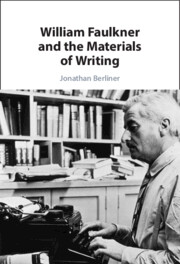Book contents
- William Faulkner and the Materials of Writing
- William Faulkner and the Materials of Writing
- Copyright page
- Contents
- Acknowledgments
- Introduction
- Chapter 1 Not Even Past: Media, History, and Repurposing the Text
- Chapter 2 Parchment Bodies: Race and Writing Materials
- Chapter 3 Inkwell Eyes: Writing, Gender, and the Body
- Chapter 4 Circuits of Media: Airplanes, Newspapers, and the Afterlife of Novels
- Chapter 5 On Carpentry: Religion and the Question of Literature
- Chapter 6 From Ivory to Foolscap: Writing and Intimacy
- Works Cited
- Index
Chapter 5 - On Carpentry: Religion and the Question of Literature
Published online by Cambridge University Press: 24 May 2023
- William Faulkner and the Materials of Writing
- William Faulkner and the Materials of Writing
- Copyright page
- Contents
- Acknowledgments
- Introduction
- Chapter 1 Not Even Past: Media, History, and Repurposing the Text
- Chapter 2 Parchment Bodies: Race and Writing Materials
- Chapter 3 Inkwell Eyes: Writing, Gender, and the Body
- Chapter 4 Circuits of Media: Airplanes, Newspapers, and the Afterlife of Novels
- Chapter 5 On Carpentry: Religion and the Question of Literature
- Chapter 6 From Ivory to Foolscap: Writing and Intimacy
- Works Cited
- Index
Summary
Chapter 5 explores Faulkner’s lifelong interest in the physicality of writing and the relationship of this interest to questions about religion and literature. With his 1954 novel A Fable, he foregrounds a play of text and materiality that had been present in his work since his early handmade books. Faulkner persuaded Random House to issue A Fable with no title on the hardbound cover beneath the dust jacket but rather iterations of the cross, a motif they used throughout the book, but which has disappeared from current editions of the novel. Faulkner dedicated the book to his daughter Jill on her twenty-first birthday, which he later maintained was a way of saying that she was now on her own. The book itself, though, which interweaves aspects of the Gospels with a First World War narrative, becomes its own quasi-sacred physical support for readers, a new kind of Bible as material text. Multiple characters in the novel try to find versions of sustenance in physical texts, but many come away disappointed. Finally, the chapter examines Faulkner’s ambiguous use of the term literature, which generally took on a more positive sense for him when connected with the materials of writing.
- Type
- Chapter
- Information
- William Faulkner and the Materials of Writing , pp. 117 - 137Publisher: Cambridge University PressPrint publication year: 2023

